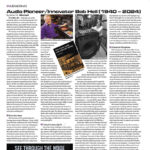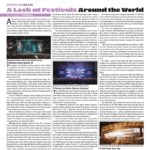The drive behind expanding is varied, but sound companies across the States are looking towards a number of methods to accomplish the goal. This month FOH checks in with three companies who have seen an impressive factor of growth over the past five years, Thunder Audio, Maryland Sound International and Audio Analyst.
These three companies have a number of things in common, including a strong regional presence before jumping into the national spotlight, an approach toward expanding both touring and installation business and a careful and thought out plan before the first step was taken. "We wanted controlled growth," reports Audio Analyst co-owner and vice president of engineering Albert Leccese. "We did not want to turn into a $50 million mega-corporation. The rule that we used here was to not do any more work than you have qualified people to do the work. That's a hard thing to do, because you're sitting there thinking about this contract that's out there. But, if you're already busy than that's fine."
Six years ago, the Colorado Springsbased company turned a more focused eye towards building a greater installation business. The drivers behind the turn included the fact that the company was getting more and more requests and "the fact of trying to flatten out the bio-rhythm of income," Leccese says. "In the summer time we'd be renting the fridge here if we could, and in the middle of winter we'd have no work for two months. So, how do you go from feast to famine and equal that out? We decided to look for other sources of income and that's where we developed a couple of areas."
The first was the manufacture and sales of the company's monitors and wedge cabinets and the Tensalite Packaging Cases. The second was the installation business, where the company serviced local clubs and churches. The team also started to look towards finding new bands to help.
"Where the touring department has made sure that it stays diversified is that we are very conscious of trying to sign young up and coming acts, as well as established acts," explains Audio Analyst's vice president of the touring division Bruce Eisenberg. "That's been very consciously thought out. In that sense, although we probably had a reputation as a rock and roll touring company, and we still are, we're diversified into lots of different areas whether it be Christian music or Latin music."
He adds that the company's growth in both the installation and touring businesses was important for a specific reason. "I think that in any business it's very important to find as many income streams as you possibly can," he starts. Then he adds, because the company has focused on the installation business, "It was a diversification more than anything else. It wasn't something that was done because of a failing touring department, it was something that was done because it was a natural off-shoot."
That's true at Thunder Audio as well, reports the company's founder and president Tony Villarreal, since installations are something that the company has relied on to cover its bottom line. In fact, Villarreal has been working with Chene Park in Detroit for the past 15 or so years, and the money that the company earns there is used to purchase new equipment for its summer clients. Thunder also provides services to Freedom Hall in Detroit, which helps to cover the company's monthly nut.
This summer has seen the company doing quite a few one-offs which reminded him of the time when Thunder was a new company. "Prior to Thunder Audio getting leases for massive amounts of equipment, I had seven installs around the city of Detroit that brought me in revenue that would offset building expense, phones, heat, electric, truck repair and things of that nature," he says.
Of course, Thunder is a company that moved beyond corporate gigs and regional assignments (two important books of business for any sized company, and ones that Thunder has not given up on) once Metallica came into the fold with Paul Owens, and has serviced a handful of metal bands and tours. Recently, the phones at Thunder's Michigan headquarters have been ringing with requests from clients that fall, Villarreal admits with a laugh, into the lightweight market.
But that kind of do-it-all approach is working. "As diversity goes you can't just have yellow pickup trucks on your lot as you will only sell to people who want them, " says Owen. "We are recognized as taking care of lots of heavier acts but there isn't a year goes by here where we don't have two or three plays out with an artist like Tyler Perry who became huge in the last two year with his Medea films. But if I used him as a reference to someone from a rock tour they would laugh their asses off." The really funny thing is that Perry turned over more than most top touring rock artists and brought in some major income to the company.
"Who would have thought that Thunder Audio,would be doing Kem , Anita Baker, Kirk Franklin, Andrea Bocelli, and Megadeth in the same year?" asks Owen. "Pretty diverse I would say."
That is also a look back for Villarreal. "A lot of the people in the United States and in Europe think we're just a heavy metal company, and I used to mix Tony Orlando and Dawn," he says with a laugh. "I was hired to do 14 shows with Mr. and Mrs. Bob Hope and a symphony." Villarreal also spent five years mixing the Detroit Symphony where he worked with Cab Calloway, Rosemary Clooney and a handful of other talents.
The crew at Maryland Sound International has moved between gigs with Neil Diamond, Hall & Oates, David Bowie, Pink Floyd, Whitney Houston and Josh Groban to heavy metal stalwarts Disturbed. In fact, MSI worked with FOH mixer Scott Canady on Disturbed's run on the recent Jagermeister Tour. According to MSI's Todd Goldstein, the Disturbed tour was a huge priority for the company. "Whether it pays nothing or pays a lot, I've been trying to get rock back at the company," he says. "This band is great to represent MSI."
But it's not just the big bands that are a priority for MSI. Monitor engineer William Miller, who mixed monitors for Disturbed, as well as a host of other MSI gigs says, "My goal is to facilitate the artists' performance, no matter the style. I think the reason MSI and myself have been able to handle such diverse artists is a willingness to provide the same level of service across the board. I don't know too many other companies that send the same engineers to do a club tour, a corporate dinner, an arena headliner and the inauguration and always get consistently satisfied clients."
While the company's specialized bass cabinets eased the transition between musical genres, Canady points out that what puts MSI over some other companies is the level of service he received while on the road. "Todd would call me and say, 'Whatever you need' and he has not been joking about that at all," he says. "He would call me after he sent some gear and say, 'Whatever you want. It's here. I'll get it to you. If we don't have it, we'll find it, we'll buy it, we'll make it. Anything.' It got to the point where I didn't know what to ask for, and that's probably one of the best approaches anybody has come to me with in the last five years."
Todd reinforces that point. "I find that a lot of companies and company staff settle for their shows to be OK sounding," Todd says. "But Maryland Sound is all about helping guest engineers and staff engineers get the best possible audio they can and not settle for anything else. We work and work to get the sound systems to sound amazing."
In that philosophy, Todd is doing nothing more than carrying on what MSI founder Bob Goldstein started. When the elder Goldstein went out on the road for the first time in 20 years with Josh Groban he sat down for an interview with FOH and when the subject was raised of the inevitable audio compromises that are made on any tour, his response was telling. "I accept that as reality," he said. "I don't like it, I don't want it to be reality and I'll try everything I can to make it not reality. Last night I was willing to accept eight bad seats out of 3000 and I want to get that down to two or one–or none."
In the end, that may be the most important factor in how a sound company can expand. Indeed, Leccese, Villarreal and Goldstein all point to the same theme, because the business these days is more than boxes. It's about people and it's about reputation. "As tempting as it is to accept a whole bunch of work, it's real easy to overstretch yourself and not take care of the contracts that you get," Leccese states. "You go out and get a good reputation by doing a lot of jobs, but it's real easy to lose it by doing a couple of bad jobs. You're only as good as your last show."



